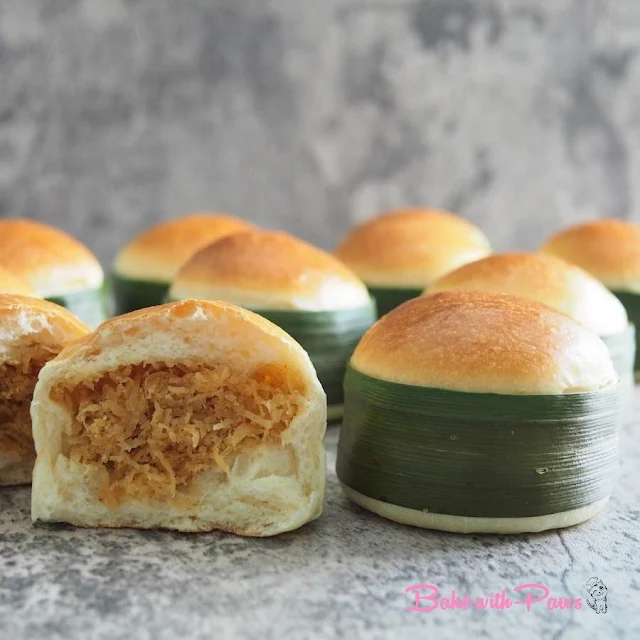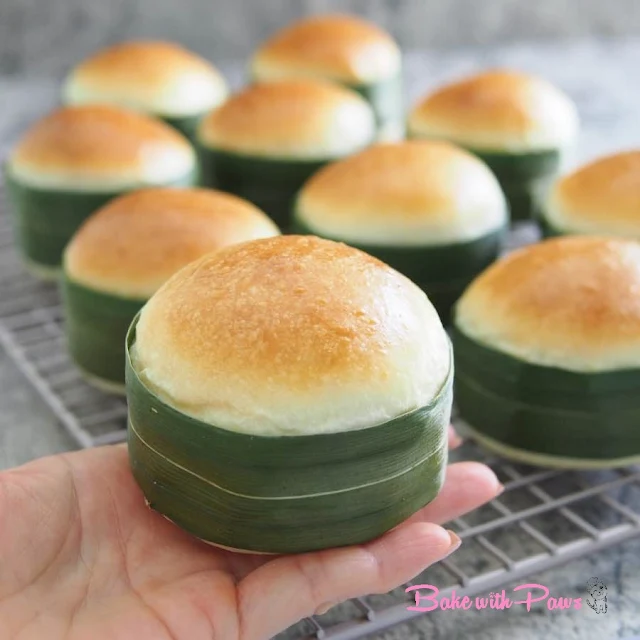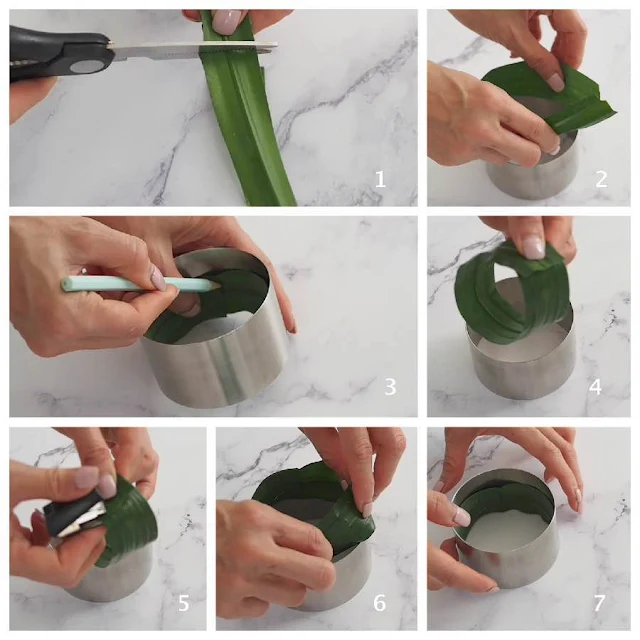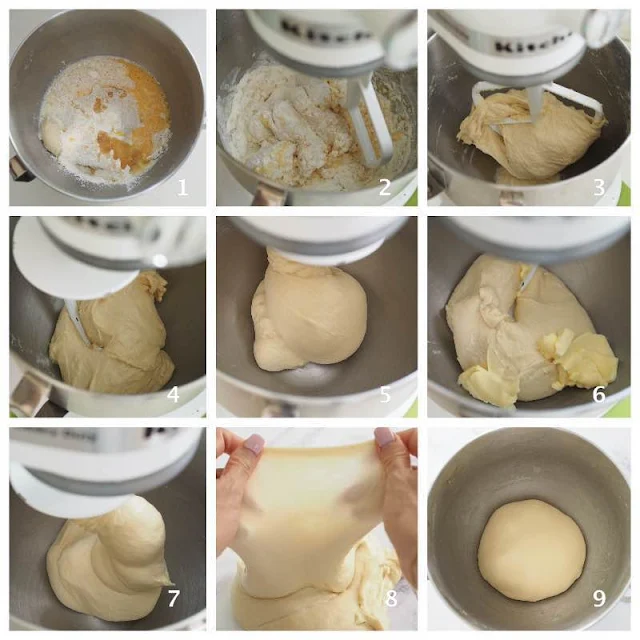Breads (Sourdough) - Soft Buns/Rolls
Sourdough Coconut Buns – Soft, Sweet & Tropical
April 07, 2023
| Recipe by Bake with Paws
Last Updated on September 4, 2025
By Bake with Paws
A Taste of the Tropics
These Sourdough Coconut Buns are soft, fluffy, and filled with fragrant coconut cooked in gula melaka (palm sugar). Combining the Sweet Stiff Starter (SST) and Yudane method, this recipe produces buns with amazing oven spring, delicate crumb, and longer freshness. It’s a tropical comfort food that blends traditional Asian flavors with the natural leavening power of sourdough.
Why You’ll Love This Recipe
- Soft and fluffy – the Yudane method locks in moisture.
- Balanced sweetness – coconut filling with rich palm sugar.
- Healthier natural fermentation – sourdough makes the bread easier to digest.
- Stays fresh longer – thanks to both Yudane and sourdough fermentation.
Sweet Stiff Starter (SST)
This recipe uses a Sweet Stiff Starter instead of liquid levain. SST has a lower hydration (around 50%) and a touch of sugar, which encourages yeast activity while reducing acidity. The result?
-
Less sour flavor – buns are pleasantly mild, not tangy.
-
Faster proofing – SST helps the dough rise more consistently.
-
Stronger gluten network – leading to better oven spring and softer crumb.
If you’re new to SST, check out my full guide: Sweet Stiff Starter Guide on Bake with Paws
Yudane Method
The Yudane method involves scalding flour with boiling water to gelatinize the starch. This step helps trap moisture and gives the bread:
- Extra softness – buns stay pillowy for days.
- Improved elasticity – easier shaping and handling.
- Better shelf life – bread remains fresh longer without additives.
- When combined with sourdough and SST, Yudane creates a truly soft and luxurious bun.
For more details on the Yudane Method, please visit my “Bread Baking Method” page.
How To Make Coconut Buns (Sourdough)
Ingredients (Yields: 10 Coconut Buns)
Yudane Dough:
70g bread flour (I used Japan High Gluten Flour)
70g boiling water
Sweet Stiff Starter:
60g sourdough starter (100% Hydration), preferably use at its peak
180g bread flour (I used Japan High Gluten Flour)
75g water or 90g milk
30g sugar (I used organic brown sugar)
Main Dough:
70g bread flour (I used Japan High Gluten Flour)
All stiff starter (above)
All the yudane dough (above)
15g brown sugar (I used organic brown sugar)
1 tsp salt
20g milk powder (omit if SST is fed with milk)
15g water, cold (reserve half and add in all if needed)
45g cold egg, whisked (from 1 medium egg)
35g butter, room temperature
Egg Wash:
1 egg + 1 tbsp water, whisked
Gula Melaka Coconut Filling: (Please click here for Pandan Coconut Filling)
250g grated fresh coconut (only the white part)
50g - 80g palm sugar (gula melaka), please add more if you prefer sweeter.
Pinch of salt
Pinch of salt
200g water
2 tsp corn starch + 2 Tbsp water
4 pandan leaves, cut into about 4 inches length
Utensil:
Baking tray
10 units of Round Mould Ring (8 cm diameter X 5 cm height)
10 pandan leaves
Step-By-Step Method
- Gula Melaka Coconut Filing:
- Combine palm sugar, water and pandan leaves in a sauce pan. Boil till sugar dissolved.
- Discard the pandan leaves. Sieve the syrup to remove any impurities.
- Add in grated coconut and salt. Stir well then add in corn starch mixture.
- Cook over medium heat till the coconut is cooked and until turn slightly dry. Stir constantly to prevent burning.
- Dish out and set aside to cool.
- Divide the filling into 10 portions and and roughly roll into balls weighing 30g each. You may have some balance.
- Yudane:
- Add bread flour in a bowl, pour the boiling water and mix well with spatula or spoon until no dry flour.
- Cling film and leave on the counter for at least 4 hours or overnight in the fridge. I prepared the night before.
- Use directly from the fridge.
- Sweet Stiff Starter
- Dilute starter with water, stir in sugar and mix in bread flour to become a dough. Please use stand mixer with paddle attachment to mix if you find hard to mix with hand.
- Cover and let it ferment until tripled. I prepared a night before and leave it in aircond room (approximately 24 - 25C room temperature) overnight until tripled. It took about 8 - 9 hours depending on your starter. It should take around 4 - 6 hours to get triple at room temperature at 28C - 30C. The starter should look smooth and round dome. It shouldn't collapse.
- Prepare Round Mould Ring:
- Trim the pandan leaves.
- Make a ring same size as the mould.
- Staple both ends together with a stapler.
- Line the side of each mould ring with pandan leaves.
- Main Dough:
- Put all ingredients (except butter), including all the stiff starter and yudane dough into a bowl of stand mixer.
- Slightly combine the mixture by hand with the paddle attachment before turning on the machine so that the flour will not splash out. Using the paddle attachment, mix for 2 minutes or until all incorporated. This step is critical to prevent an uneven mixed dough as the stiff starter is rather hard and a dough hook may not be able to mix it well enough.
- Change to hook attachment and knead for another 3 minutes or until the dough comes together. Add in butter and continue knead for 10 - 12 minutes or until reach window pane stage. The whole kneading process, I stopped few times to scrape down the dough from the hook to be sure it is evenly kneaded and also to prevent the motor from overheating.
- 1st Proofing/Resting:
- In the same bowl, let the dough rest for 45 - 60 minutes. Keep it covered with clingfilm or use a lid. This dough I rested for 45 minutes and the dough rose slightly in 45 minutes.
- Shaping:
- Transfer the dough to a clean surface slightly dusted with flour, divide dough into 10 equal portions (approx.65.5g each). Please use a kitchen scale if you want to be exact.
- Shape each dough into a ball and rest for around 15 minutes.
- Roll a dough ball into a disc, the edges slightly thinner than the centre.
- Place a coconut filling ball in the centre. Gather up the edges to seal and shape into round ball.
- Place the buns on the lined baking tray.
- Place the prepared mould ring on each bun.
- Final Proofing:
- Let the buns proof at a warm place until the dough rise double in size. This one took approximately 2 hours at at room temperature of 29C - 30C. The duration of proofing depends on your ambient temperature and starter.
- Baking:
- Preheat oven at 190C - 200C (top & bottom heat) or 180C (fan-forced) for 10 - 15 minutes.
- Brush with egg wash.
- Bake in a preheated oven for 15 - 20 minutes, or until golden brown.
- Remove bread from oven and let them cool on rack.
Coconut Filling
Yudane Dough
Sweet Stiff Starter
Lined The Mould Ring
Main Dough
Tips for Perfect Sourdough Buns
- Sourdough Starter:
- A healthy starter is essential for successful bread baking. To ensure your bread rises well, it's important to feed your starter regularly and use it (the levain) at its peak. A consistently fed starter will be more active and reliable. If the mother starter isn’t strong, the dough may still struggle to rise properly, even if the levain is used at its peak. For more information, click the links: "How To Make Sourdough Starter" and "Sourdough Maintenance".
- Gluten Development:
- Essential for soft, airy bread, gluten is created when flour hydrates. To develop it, use techniques like autolyse or kneading. The windowpane test checks readiness—dough should stretch thin without tearing. From my experience, high hydration dough with high percentage of fat will be easy to stretch and achieve a paper thin windowpane stage.
- Kneading:
- Please regard the timing provided as an indication only. It is only meant as a guide. Times vary by flour and mixer type. For higher fat dough, knead longer (18–20 minutes).
- Flour & Hydration:
- Use high-gluten flour for optimal texture. Always reserve some liquid to adjust dough consistency for best results. If dough is too dry, add the reserve liquid one tablespoon at a time until the right consistency.
- Dough Temperature:
- Maintaining the right dough temperature during kneading is crucial for a fine crumb. If the dough becomes too warm, the crumb will become too big and uneven. To prevent this, use cold water, milk, or eggs, and chill your mixing bowl or hook attachment in the freezer. Knead at low speeds, and if your kitchen is warm, rest the dough in a cooler spot. Proper dough temperature ensures a soft, fluffy bread with a fine, even crumb.
- Proofing:
- Proofing time depends on your environment. Use the finger poke test to gauge readiness. To check dough readiness, lightly press the side with your finger:
- If it bounces back instantly, it’s under-proofed and needs more time.
- If the indentation stays, it’s over-proofed.
- If the indentation slowly bounces back, it’s ready to bake.
- There’s also a final rise called oven spring when the dough bakes, which adds to the bread’s height.
- Wrinkle Top or Shrinking:
- If your bread collapses or develops wrinkles on top after baking, it might be over-proofed during the second rise. Aim for the dough to rise to 80-90% of its final size or just below the rim of the pan to prevent this. Over-proofing leads to weaker structure, causing the bread to lose shape.
- Baking & Oven Temperarate:
- Do also note that the baking temperature and timing provided are what works for my oven and should also be regarded as a guide only. Every oven behaves a little differently, so please adjust accordingly for your oven.
FAQs about Sourdough Coconut Buns
Q: Can I use dried coconut instead of fresh?
Yes, but rehydrate dried coconut with warm water or coconut milk for best texture.
Q: How do I store these buns?
Keep in an airtight container for 2–3 days at room temperature. For longer storage, freeze and reheat gently.
Q: Can I replace gula melaka with brown sugar?
Yes, though gula melaka has a unique caramel-like flavor that makes these buns special.
Other Recipes You Might Love
Pandan Coconut Buns – another tropical favorite using instant yeast
Pumpkin Kaya Buns - Delicious Asian Taste soft buns using instant yeast
Soft Sourdough Pandan Buns - Aromatic and Soft
Subscribe to Bake with Paws
Love sourdough recipes with a twist? Subscribe via the pop-up box to get my latest recipes, baking tips, and sourdough guides straight to your inbox.
Have a Question or Tried This Recipe?
I’d love to see your version of these buns! Share your bake on Instagram and tag @bakewithpaws, or leave your questions in the comments below.
Labels:
Breads (Sourdough) - Soft Buns/Rolls,










Such a unique way to bake the buns! May I know where you bought the round mould rings from please?
ReplyDeleteHi, thank you for visiting Bake with Paws. I ordered online from Shoppee.
DeleteCheers :)